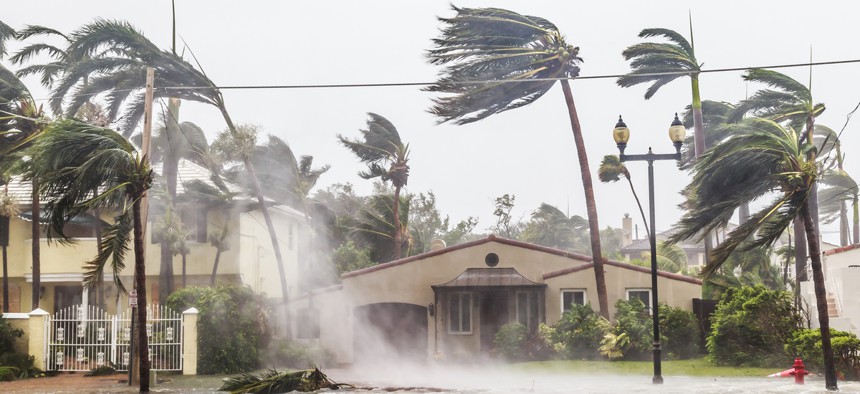Former Emergency Managers: Act Now Before the Next Storm

A flooded street after caused by Hurricane Irma in Florida FotoKina
COMMENTARY | A former FEMA Administrator and former Florida emergency manager urge states and local governments to invest time and resources into preparing for future severe weather events.
The United States was mostly spared the devastating wrath of Hurricane Dorian. Although the extensive damage caused in the Bahamas by a storm the size, intensity and duration of Dorian is not 100 percent preventable, there are actions state and locals can take now to lessen the blow future storms deliver to our shores.
Hurricane Dorian was the fourth Category 5 hurricane in the Atlantic in the last four years—three of which impacted Florida. Whether a glancing blow like Dorian or a direct impact like Hurricanes Michael, Irma and Maria these storms serve to remind us that we need to do everything possible to prepare our communities for more frequent, severe storms. The recent flooding caused by Tropical Storm Imelda, which for the second time in a little over two years dumped multiple feet of rain in the Houston area, also reminds us that even storms categorized as less severe can be devastating. Acting now will save lives, preserve businesses and homes, improve our quality of life, reduce response and recovery costs and make our communities more attractive places to live and work.
Our home state of Florida has been on the forefront of resilience planning. The state made major strides and acted based on lessons learned from previous storms by improving building codes after Andrew, hardening the electrical grid after the destructive hurricane seasons of 2004 and 2005 and ensuring the elderly and infirm living in nursing homes are protected following Irma.
These actions, while effective, came after the fact. However, the time to take monumental steps in resilience and preparedness is before a storm strikes. States and locals can mitigate the damage caused by severe weather by committing time, people, money and resources into resiliency measures. For example, hardening critical lifeline infrastructure systems such as water, power and sheltering systems prior to a storm is one of the wisest investments of taxpayer dollars. These investments generate a $6 to $1 return on the initial outlay in terms of costs avoided during future storms according to the National Institute of Building Sciences’ Multi-Hazard Mitigation Council
States and locals also should work to involve their residents in preparing for the natural hazards that come with living in risk-prone areas. One way to encourage residents to focus more on resilience is through federal grant-based “Safe Home” programs that incentivize retrofitting homes for disasters. These investments enable homes to better withstand severe weather and result in lower insurance premiums, putting money back into the pockets of tax payers and into state and local economies. “Safe Home” programs coupled with improved building codes will enhance the protection of homes and businesses and will help communities recover more quickly.
States and locals are not alone in resilience planning. The federal government also is committed. Last year, the U.S. Congress enacted the Disaster Recovery Reform Act which created FEMA’s new Building Resilient Infrastructure and Communities (BRIC) program. This program will significantly increase grant dollars for states and locals for pre-disaster mitigation by providing up to $1 billion a year for large infrastructure projects that will keep communities from flooding and build electrical delivery systems that could withstand the winds of a Category 5 hurricane. Existing federal resources such as FEMA’s existing hazard mitigation programs can assist communities in building lifeline infrastructure with storm-resistant standards and materials, as was done proactively in the Florida Keys with power transmission poles. Outside of government, states and locals can also leverage the actions, investments, expertise and best practices of private businesses, offering another opportunity to lessen risks to our communities.
As emergency management professionals, there is nothing more devastating to us than seeing the unnecessary loss of life. Spending time, effort and investment before is the best way to deal with hurricanes. Let’s ensure that our local, state, and federal governments keep the focus where it should be—being ready for this hurricane season and all future storms.
David Paulison is a Senior Advisor to the BuildStrong Coalition, and served as the Administrator of the Federal Emergency Management Agency (FEMA) from September 2005 until January 2009 and the Chief of Miami-Dade Fire Rescue from 1992 until his retirement in 2001.
Bryan Koon is the Vice President of Homeland Security and Emergency Management at IEM, and served as the Director of Florida’s Division of Emergency Management from February 2011 until October 2017 and the Director of Emergency Management at Walmart from 2009 until 2011.
NEXT STORY: Parking Reform Will Save the City





